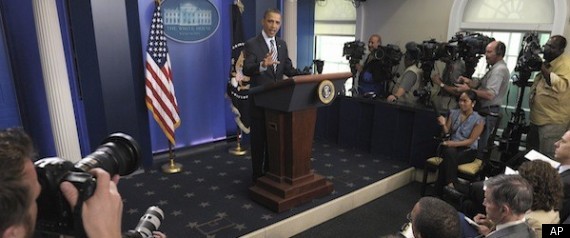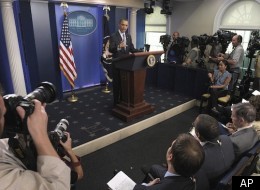
First Posted: 8/3/11 02:37 PM ET Updated: 8/3/11 04:05 PM ET

NEW YORK -- USA Today columnist DeWayne Wickham says a "cataclysm" is coming and the national media isn't ready for it.
"I've been warning my editors," Wickham told The Huffington Post, regarding the high levels of black unemployment in America. "We're in a circle here. We're getting back fast to that pre-'68 period. We didn't have a few race riots. We had hundreds of them."
Wickham, who expressed his "disappointment" with Obama over poverty and joblessness a few months back, says news outlets -- often with shrinking minority representation -- seem more concerned with pleasing advertisers than aggressively covering such issues. "You can't have these numbers of people dispossessed for so long while so many do well for so long," Wickham said. "To ignore it, we do at our own risk."
But Wickham's not alone in arguing that the national media hasn't paid enough attention to the growing problem of black unemployment -- now double the average of white unemployment -- or other issues that disproportionately affect African Americans. In interviews with The Huffington Post, several prominent figures in media, academia and activism say that the historic election of the nation's first black president hasn't helped to turn the national spotlight on issues like the widening wealth gap, prison systems or the current state of the black middle class.
"It's become worse since Obama has been president, and that's simply because he has not gone into the black community," said Carole Simpson, a former ABC News anchor and author of the 2010 memoir "NewsLady." "I think there is much less coverage because of this."
"SPECIAL RESPONSIBILITY"
Obama didn't campaign on an explicitly black agenda, so it's not surprising he hasn't advocated for one since taking office. Still, critics contend that Obama hasn't given much attention at all to the black community (and therefore the news media hasn't followed).
Obama didn't campaign on an explicitly black agenda, so it's not surprising he hasn't advocated for one since taking office. Still, critics contend that Obama hasn't given much attention at all to the black community (and therefore the news media hasn't followed).
Most notably, Dr. Cornel West and PBS talkshow host Tavis Smiley argue that Obama is more beholden to bankers than black Americans who've been hurt by the recession -- a position that could be amplified as they kick off an 18-city poverty tour on Saturday.
On July 22, NPR's Michel Martin asked Obama about West's most-quoted contention -- that he's a "black mascot of the Wall Street oligarchs" -- and questioned whether the president feels "any special responsibility to look out for the interest of African Americans." Obama said he has "a special responsibility to look out for the interests of every American."
Richard Prince, who writes Journal-isms, a blog focused on media diversity issues, wasn't surprised by the response. "I think most African Americans understand that Obama is president of all the people and the posture that he must take when he is asked questions like this,” he said.
Simpson agrees, noting that Obama would be harshly criticized if it appeared he was paying "particular attention to the black community or giving it any special treatment or special access." She added that President Bill Clinton -- who enjoyed similarly overwhelming support from African Americans at the polls -- wouldn't face similar blowback for speaking directly about what he'd do for the black community.
"Clinton was beloved by the black community," she said. "He was in and out of it all the time at churches. And today, black people just love Bill Clinton. At this point, I would say they love him even more than they love Obama, because there has been some angst that he hasn't focused on the community."
COVERING THE PRESIDENT
Two days after Obama addressed cheering crowds in Chicago's Grant Park, I wrote about expectations that the White House press corps would become more diverse than in the past. But two-and-a-half years later, one prominent White House reporter notes that it hasn't happened.
Two days after Obama addressed cheering crowds in Chicago's Grant Park, I wrote about expectations that the White House press corps would become more diverse than in the past. But two-and-a-half years later, one prominent White House reporter notes that it hasn't happened.
"The press corps is not as diverse as it should be," said April Ryan, of American Urban Radio. "There were more African-American reporters or producers when Bill Clinton was president."
However, Ryan -- dubbed one of the White House press corps' new deans by Politico -- thinks there's actually been more coverage of black unemployment during the Obama era than during previous administrations. That doesn't mean that Ryan's satisfied with the media attention so far. "Is it enough?" she asked. "No, it's not enough."
Joel Dreyfuss, managing editor of The Root, says "The amount of coverage of issues in the black community is at a low point," and is far less than it was when he broke into journalism in the 1960s.
Back then, he said, there was a "great fear of what was happening in the black community" and white editors responded by dispatching young black journalists to cover the inner cities. But with declining crime rates in major cities -- along with less focus on civil rights and racial unrest -- that's no longer the case.
Eugene Robinson, a Pulitzer Prize-winning columnist for The Washington Post, says he hasn't observed any significant change in diversity at news organizations or in coverage of issues affecting African Americans since Obama took office. "I just haven't seen it," Robinson said. "So if that's what we were expecting, we didn't get it."
Robinson says he didn't expect increased coverage of black issues simply because there's a black president. But Robinson said he was surprised at just how quickly the media pivoted from commenting on the historic nature of Obama's inauguration to the everyday issues facing the government.
"It's not a bad thing that the first black president is almost immediately assessed and reported on, on the basis of what he does and doesn't do, and race is not a predominant factor," Robinson said. Still, he noted, "It happened fast."
"It's not a bad thing that the first black president is almost immediately assessed and reported on, on the basis of what he does and doesn't do, and race is not a predominant factor," Robinson said. Still, he noted, "It happened fast."
POSITIONS AND PERSONALITIES
The White House press office regularly reaches out to African-American journalists and popular radio hosts as part of its overall media strategy. The Obama administration will send nearly a dozen representatives to this week's National Association of Black Journalists (NABJ) convention in Philadelphia, and the president has recently sat down for interviews with hosts Steve Harvey, Joe Madison and Doug Banks.
The White House press office regularly reaches out to African-American journalists and popular radio hosts as part of its overall media strategy. The Obama administration will send nearly a dozen representatives to this week's National Association of Black Journalists (NABJ) convention in Philadelphia, and the president has recently sat down for interviews with hosts Steve Harvey, Joe Madison and Doug Banks.
But West, a professor at Princeton University, says Obama has been reluctant to engage with his critique that the White House serves the interests of the wealthy at the expense of the poor. When Martin brought up West's criticism on NPR, for example, Obama only responded to the second part of the question focused on his "special responsibility."
"He's been asked that second question a zillion times, and he came back with the same generic answer that 'I'm president of everybody, not these folks,'" West said, adding that if Obama addressed a group of business leaders, prominent Catholics or AIPAC, he'd be expected to speak specifically to each constituency's interests.
"But when you go to black America, you say, 'I'm president of everybody,' and then hardly say anything about what you're going to deliver," West said. "So that’s another way of hiding and concealing the ways in which he holds at arm's length the deep concerns as it relates to the suffering of black Americans."
West says the media too often turns debates over policy into personal squabbles -- as when it focuses on him, Smiley, Obama or the Rev. Al Sharpton. While Sharpton and West famously sparred on MSNBC in April over their differing views of Obama's record, they seem to agree on this particular point.
"I think that there is not enough attention in the national media on the conditions and the challenges of the average black American," Sharpton said, "and I think there has only been the superficial coverage of blacks [and] whether blacks are in the president's camp or not, instead of dealing with the complexities of the issues."
Sharpton, who serves as president of the National Action Network and is in talks with MSNBC to host at the 6:00 p.m. hour -- a programming move that's rankled some black journalists -- says "the press deluded themselves going in, that with the election of President Obama, race would no longer matter." So now, he continued, "they're trying to confirm their own delusion that positions don't matter, only personalities."
"The media puts us in this pro-Obama camp or this anti-Obama camp," Sharpton added. "That's been the coverage of black America."(www.huffingtonpost.com)အီးေမလ္းမွ ကူယူတင္ျပလုိက္ပါသည္။


 Rangoon Time
Rangoon Time